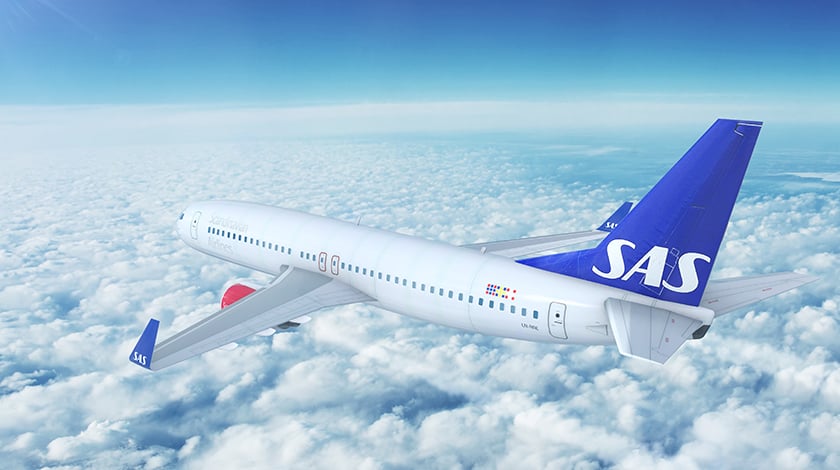Photo: Shutterstock
Reading Time: 2 minutesSAS capacity was down by 76% and total number of passengers were 75% lower compared to same period last year. Number of passengers remains low due to limited demand in the light of the ongoing COVID-19 pandemic.
SAS continues to resume flights to its destinations as demand returns and travel restrictions are easing. Compared to June, the number of passengers increased by nearly 300 thousand but showed a decrease of 2.5 million compared to same period last year. Domestic routes are showing the strongest recovery, whereas demand for Intercontinental and European travel remains weak.
“We continue to note a slow recovery of demand, in line with our expectations. As demand slowly returns, we are pleased to gradually ramp up our operations while ensuring a safe travel experience for our customers and employees,” says Rickard Gustafson, CEO SAS.
| SAS scheduled traffic | Jul20 | Change1 | Nov19-Jul20 | Change1 |
| ASK (Mill.) | 1 308 | -73.5% | 18 575 | -47.2% |
| RPK (Mill.) | 662 | -83.9% | 11 746 | -54.1% |
| Passenger load factor | 50.6% | -32.6 p u | 63.2% | -9.6 p u |
| No. of passengers (000) | 699 | -73.0% | 10,429 | -48.8% |
| SAS charter traffic | Jul20 | Change1 | Nov19-Jul20 | Change1 |
| ASK (Mill.) | 18 | -97.4% | 867 | -66.5% |
| RPK (Mill.) | 14 | -97.8% | 754 | -68.0% |
| Load factor | 81.9% | -12.5 p u | 87.0% | -3.9 p u |
| No. of passengers (000) | 6 | -97.7% | 248 | -71.0% |
| SAS total traffic (scheduled and charter) | Jul20 | Change1 | Nov19-Jul20 | Change1 |
| ASK (Mill.) | 1 326 | -76.4% | 19 442 | -48.5% |
| RPK (Mill.) | 676 | -85.8% | 12 500 | -55.3% |
| Load factor | 51.0% | -33.6 p u | 64.3% | -9.8 p u |
| No. of passengers (000) | 705 | -75.2% | 10,676 | -49.7% |
1 Change compared to same period last year. p u = percentage units
| Preliminary yield and PASK | Jul20 | Nominal change | FX adjusted change |
| Yield, SEK | 1.10 | 27.6% | 32.3% |
| PASK, SEK | 0.56 | -22.5% | -19,6% |
| Jul20 | |||
| Punctuality (arrival 15 min) | 95.7% | ||
| Regularity | 99.4% | ||
| Change in total CO2 emissions, rolling 12 months | -36.1% | ||
| Change in CO2 emissions per available seat kilometer | -3.5% | ||
| Carbon offsetting of passenger related emissions | 39% |
Definitions:
RPK – Revenue passenger kilometers
ASK – Available seat kilometers
Load factor – RPK/ASK
Yield – Passenger revenues/RPK (scheduled)
PASK – Passenger revenues/ASK (scheduled)
Change in CO2 emissions per available seat kilometers – SAS passenger related carbon emissions divided with total available seat kilometers (incl. non-revenue and EuroBonus), rolling 12 months
Carbon offsetting of passenger related emissions – Share of SAS passenger related carbon emissions compensated by SAS (EuroBonus members, youth tickets and SAS’ staff travel)
From fiscal year 2020 we report change in CO2 emissions in total and per Available Seat Kilometers (ASK) to align with our overall goal to reduce our total CO2 emissions by 25% by 2025, compared to 2005.

